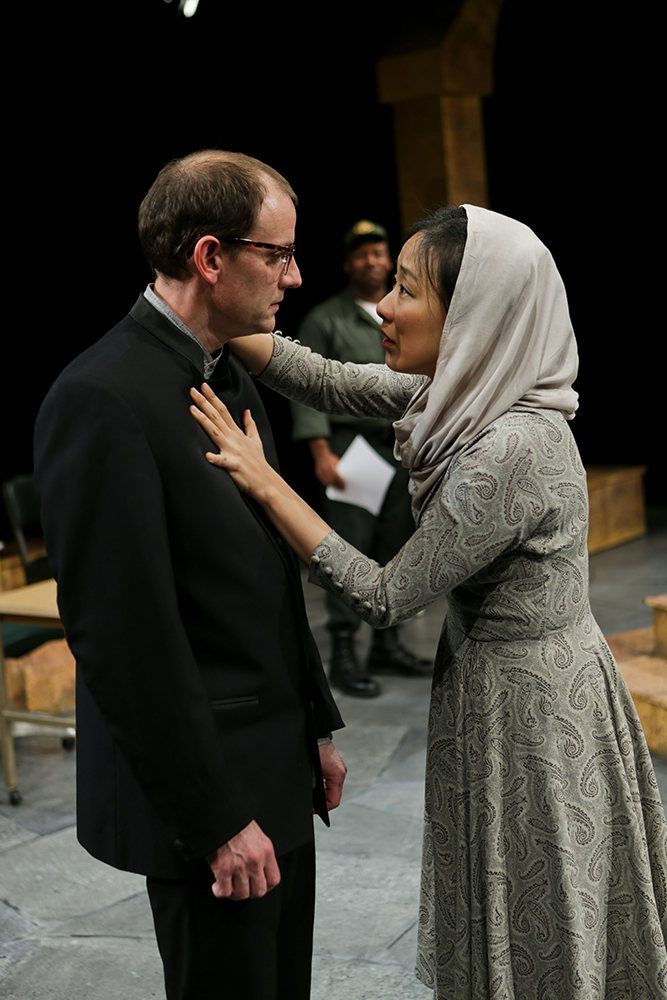Opening Nights
PMeasure for Measure
Center Theatre at Seattle Center, 733-8222. $29–$43. Runs Wed.–Sun.; see seattleshakespeare.org for exact schedule. Ends Feb. 1.
Sex! Politics! Religion! Measure for Measure bulges with dinner-party taboos and municipal dilemmas. This succinct yet itchy “unfestive comedy,” per my old Bevington edition in college, looks at the distortions and power abuses that result within a society that overregulates human affairs—literally. In this legalistic dystopia, marriage costs money; and by fornicating outside of marriage, you can lose your head—again, literally. The incarceration industry, drugs, prostitution, and other social ills proliferate amid the systemic suppression of biological drive.
Director Desdemona Chiang contrasts her spirited cast with the hulking, hook-like columns, comfortless rock surfaces, and inquisitor’s office of Phillip Lienau’s set. Here, while the legitimate Duke of Vienna (David Anthony Lewis) pretends to be out of town, petit-tyrant Angelo (a subdued Bradford Farwell) sentences Claudio (Moses Yim) to death for fornicating with his girlfriend without the proper license (marriage). Claudio’s novitiate sister Isabella (Cindy Im) intercedes on Claudio’s behalf, but refuses Angelo’s quid pro quo demand of her chastity. Chiang doesn’t shy from dark comedy, so viewers squirm when Im’s desktop attempts to escape rape border on slapstick. On another disconcerting note, his ex-fiancee Marianna (an incandescent Aishe Keita) says of the reprobate Angelo that “best men are molded out of faults and . . . become much more the better for being a little bad.” Ugh—that’s like Ray Rice’s girlfriend defending him after her elevator assault. But hey, such unromantic truths are what make this a “problem play,” rich with human foibles.
Fonts of more conventional humor include lowlifes Lucio (Tim Gouran), concave and jangling with the DTs, who heckles from the audience; natty pimp Pompey (Scott Ward Abernethy), who moonlights as executioner; and pillow-bellied constable Elbow (Harry Todd Jamieson) with his whoopee megaphone. When Lucio and Pompey tell the Duke—returned to town in disguise—their low opinions of him, it’s a delicious situational drubbing.
Measure for Measure has an unstable ending for a comedy, handled wonderfully by Chiang (with a smart line cut that provides a split-second of sitcom perfection). Lust and justice are perilous companions. Just ask Eliot Spitzer. Margaret Friedman
Tosca
McCAw Hall, 321 Mercer St. (Seattle Center), 389-7676, seattleopera.org. $25 and up. Ends Jan. 24.
Here’s a question: Does anyone actually like Tosca? Not Puccini’s 1900 opera, I mean, but its title character. At Seattle Opera’s Saturday-night performance, Ausrine Stundyte proved a courageous actress, adeptly playing up Tosca’s not-so-attractive side—her coquettishness and jealousy—as well as her later heroism. The soprano’s one vocal issue was a vibrato that, curiously, sounded fully under control only in Act 2; before and after that, it could get a bit wide and wobbly. But in between, it was beautiful, embellishing rather than dominating her vocal lines; her big solo in this act, “Vissi d’arte,” was gorgeous—passionate and thoughtful, artful and emotionally direct.
Singing her lover Cavaradossi, Stefano Secco’s voice has a fairly baritonal color, with little of the bright “ping” (squillo is the technical term) familiar in many tenors. This is an observation, not a complaint; richly easy on the ear, it lacked nothing in carrying or penetrating power, with an impressive effortlessness in his long, loud, and high (money is the technical term) notes.
“Charm” is not a word often used to describe performances of the role of Scarpia, the black-hearted police chief who comes between the two, but it was enjoyable to hear how and when Greer Grimsley let his voice go a little “Italian”—adding just hints of the scoops, slides, and sobs traditionally associated with the idiom. (He’s most often heard at Seattle Opera as Wotan in Wagner’s Ring, which is the last place you’d want to hear that kind of effect.) He and Stundyte rightfully earned unexpected mid-act applause after the scene in which she stabs him—probably because it was so powerfully staged and sung, but maybe also because the audience was cheering the villain’s death English-panto-style. Gavin Borchert
E
stage@seattleweekly.com





